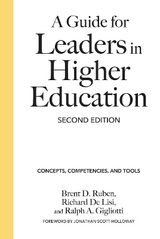
A Guide for Leaders in Higher Education
Stylus Publishing (VA) (Verlag)
978-1-62036-391-1 (ISBN)
- Titel erscheint in neuer Auflage
- Artikel merken
At a time when higher education faces the unprecedented challenges of declining revenues and increased scrutiny, questions about access, cost, and the value of degrees, and the imperative to educate a more diverse student body, there is an urgent need for leadership that is conversant with, and able to deploy, the competencies, management tools, and strategic skills that go beyond the technical or disciplinary preparation and “on the job” training that most leaders have received.
This book is intended as a practical resource for academic and administrative leaders in higher education who seek guidance in dealing with today’s complexity, opportunities, and demands. It is also addressed to those who aspire to hold positions of leadership, and to the many faculty and staff members who serve in informal leadership roles within their departments, disciplines, or institutions. Additionally, the book serves as a guide and resource for those responsible for the design and implementation of leadership development programs in higher education.
While recognizing the differences in mission and circumstance across institutional types, the authors begin by offering a foundational understanding of higher education as a sector, the political, social, and economic climate in which it operates, and the potential opportunities ahead. Subsequent sections of the book cover leadership concepts and competencies, along with a series of applied tools for leadership and organizational effectiveness. Each chapter concludes with related case studies and guiding questions for further reflection. The final section highlights models for developing institutional leadership programs that progressively meet the needs of leaders along their careers.
The content and format of this book reflect the authors’ views that leadership development is most effective when it is an intentional, reflective, and systematic experience. While they espouse the practice of general principles of leadership, they also take into account the unique context of higher education with its numerous internal and external stakeholders, multiple missions, particular organizational governance, and a culture that fosters individual autonomy and creativity.
Brent D. Ruben is a distinguished professor in communication at Rutgers University, where he also serves as senior university fellow, advisor for strategy and planning in the Office of the Executive Vice President for Academic Affairs, and was the founder of the Rutgers Center for Organizational Leadership. He is also a member of the faculties of the Rutgers PhD program in higher education and the Robert Wood Johnson School of Medicine. Brent is author or co-author of numerous publications in communication, organizational leadership, planning, assessment, and change, including Excellence in Higher Education Guide (Stylus, 2016), What Leaders Need to Know and Do (National Association of College and University Business Officers, 2006), and Communication and Human Behavior (Kendall Hunt, 2020). Ruben was a founder of the Rutgers Department of Communication, and first PhD program director of the School of Communication and Information. He was a founder and first president of the Network for Change and Continuous Innovation in Higher Education (NCCI), served as Rutgers inaugural liaison and is a frequent contributor to the Big Ten Academic Alliance leadership programs, and serves asan adviser to colleges and universities has and nationally and internationally. Richard De Lisi is an emeritus university professor of developmental psychology at Rutgers University and a Senior Fellow at the Rutgers Center for Organizational Leadership. Richard was a faculty member at Rutgers University in New Brunswick for 43 years and had more than 25 years of experience as a formal leader at the Rutgers Graduate School of Education including chair of the Department of Educational Psychology, graduate program director for the Ph.D. in Education Program, graduate program director for the Ph.D. in Higher Education Program, and dean of the Graduate School of Education from 2003 to 2014. Under De Lisi's leadership, the Graduate School of Education increased its on-line course offerings, developed its first on-line masters degree programs, developed teacher education and school counseling programs that received national accreditation, substantially expanded its Ph.D. in Education program; developed a new Ph.D. in Higher Education program; and revised its Ed.D. program as an initial cohort member of the Carnegie Project on the Education Doctorate. Ralph A. Gigliotti, Ph.D. is assistant vice president for the Office of University Strategy and director of the Center for Organizational Leadership at Rutgers University where he provides executive leadership for a portfolio of aca¬demic leadership programs, strategic consultation services, and research ini¬tiatives. He also has part-time faculty appointments in the Department of Communication, PhD program in Higher Education, and Department of Family Medicine and Community Health at Robert Wood Johnson Medical School. He is author and coauthor of numerous books and articles explor¬ing the intersection of communication, leadership, and crisis in higher edu-cation, including A Guide for Leaders in Higher Education: Core Concepts, Competencies, and Tools (Stylus, 2021), Leadership in Academic Health Centers: Core Concepts and Critical Cases (Kendall Hunt, 2021), and Crisis Leadership in Higher Education: Theory and Practice (Rutgers University Press, 2019). Gigliotti is a national examiner for the Malcolm Baldrige Performance Excellence program (National Institute of Standards and Technology, U.S. Department of Commerce). He is also actively involved in numerous boards and leadership teams, including the leadership team of the Training and Development Division for the National Communication Association and the Board of Directors for the Network for Change and Continuous Innovation (NCCI).
Foreword—Doug Lederman
Preface & Acknowledgements
Part 1: Leadership in Higher Education: A Critical Need in a Complex and Challenging Landscape
1) Leadership and Leadership Development in Higher Education: Time for Change
2) The Higher Education Landscape: Navigating the Organizational & Strategic Leadership Terrain
3) College and University Missions: Purposes, Principles, and Perspectives
4) Higher Education's Multiple Stakeholders: Perspectives and Pressures
Part 2: Leadership Concepts and Competencies
5) Campus Cultures and Intercultural Tensions: The Leader as Organizational Ethnographer and Cross-Cultural Communicator
6) The Challenging Transition from Pilot to Air Traffic Controller: Leadership in Crowded Skies
7) What is Leadership?
8) Leadership-Communication Connections
9) The Competency Approach: A Two-Dimensional View of Higher Education Leadership
10) Formal and Informal Leadership in Higher Education: Roles and Responsibilities
Part 3: Applied Tools for Leadership and Organizational Effectiveness
11) Becoming a Better Leader: Self-Assessment and Leadership Development
12) Envisioning and Achieving Excellence: A Rubric and Practical Tool for Organization Review and Improvement
13) Strategic Communication: Developing Essential Habits for Effective Leadership
14) Strategic Planning: Core Concepts and Critical Steps
15) Understanding and Leading Change in Colleges and Universities
16) Using Metrics to Track Progress, Measure Outcomes, and Assess Effectiveness
17) Crisis Leadership: Upholding Institutional Values
18) Organization Continuity and Change: Leadership Succession Planning
Part 4: Leadership Development Models
19) Leadership Development in Higher Education: A Snapshot of Approaches, Characteristics, and Programs
Epilogue
APPENDIX A: Intercultural Communication Behavior Scales
APPENDIX B: Leadership Competencies Scorecard 2.0
APPENDIX C: Change Planning Worksheets
APPENDIX D: Snapshot of Signature Leadership Programs at Big Ten Academic Alliance Member Institutions
References
About the Authors
Index
| Erscheinungsdatum | 03.12.2016 |
|---|---|
| Vorwort | Doug Lederman |
| Zusatzinfo | 36 tables, 56 figs and 5 boxes |
| Sprache | englisch |
| Maße | 152 x 229 mm |
| Gewicht | 810 g |
| Themenwelt | Sozialwissenschaften ► Pädagogik ► Bildungstheorie |
| Sozialwissenschaften ► Pädagogik ► Erwachsenenbildung | |
| ISBN-10 | 1-62036-391-7 / 1620363917 |
| ISBN-13 | 978-1-62036-391-1 / 9781620363911 |
| Zustand | Neuware |
| Informationen gemäß Produktsicherheitsverordnung (GPSR) | |
| Haben Sie eine Frage zum Produkt? |
aus dem Bereich



